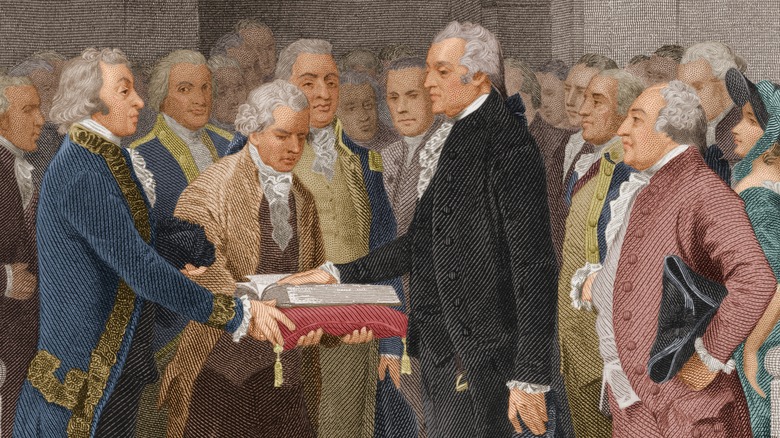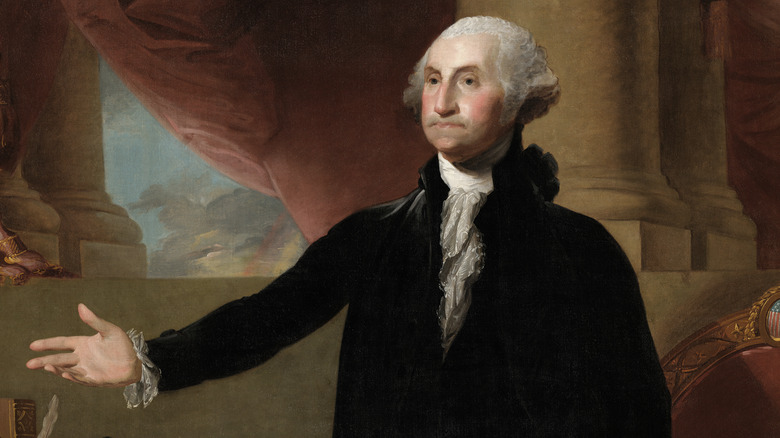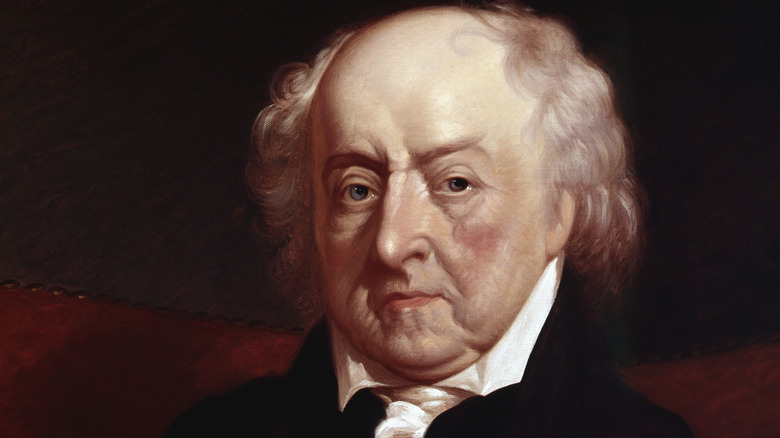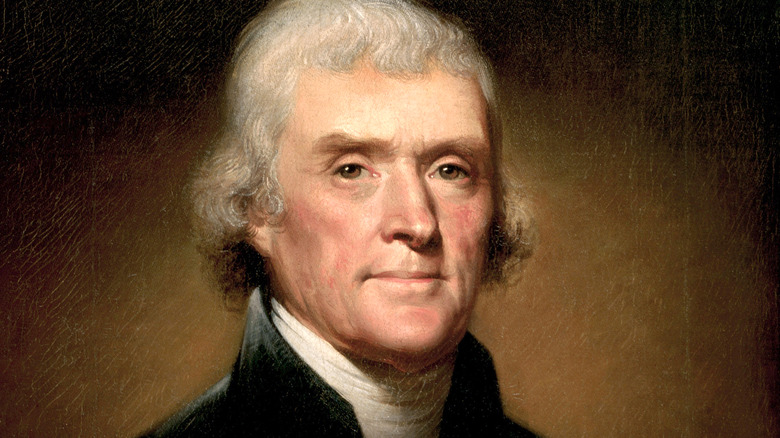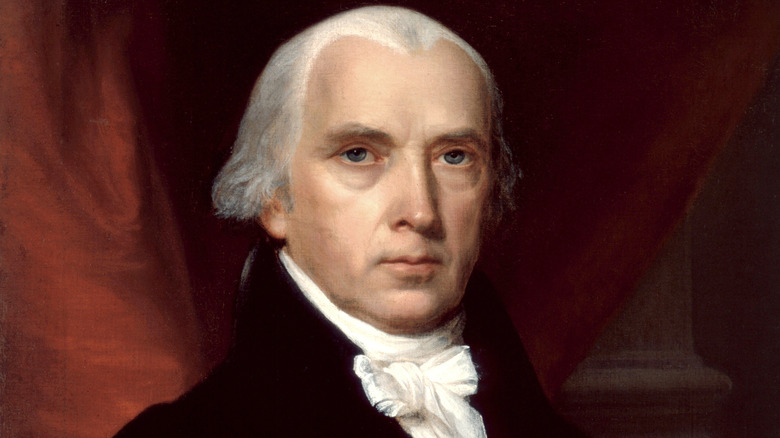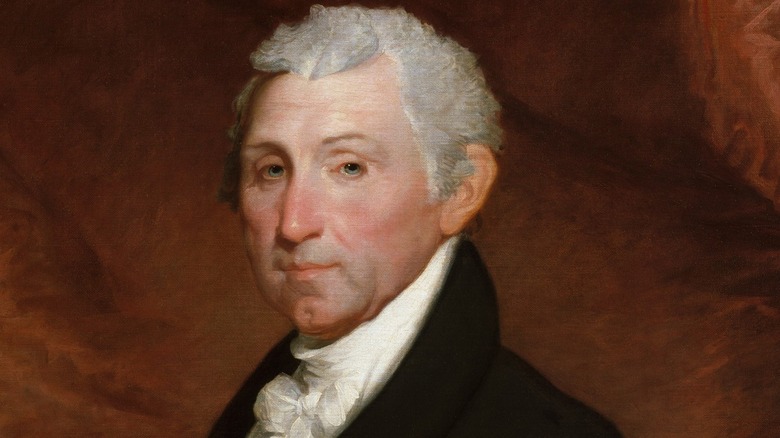How Old The First 5 US Presidents Were When They Took Office
The stipulations for who can be president of the United States are a little on the odd side. Criminal conviction doesn't disqualify you (though an impeachment conviction by the Senate will). Natural-born citizenship is a must, but it gets negated if you haven't spent 14 continuous years on U.S. soil. And for all the noise made about the age of presidents and potential presidential candidates in 2023, the only mention of a president's age in the Constitution related to the presidency is that they must be at least 35 years old.
According to the National Constitution Center, there was no debate about the age requirements for president — and little on those for any other office. The Federalist Papers' discussion on age in the Senate suggests that fear of dynastic developments played a role in setting such limits; it was considered highly unlikely at the time that any father would have a son old enough to meet the age requirement and come into the office on his family name. Recent history may argue against that logic, and there is something undemocratic about denying people old enough to vote the chance to run for office, but no serious legal challenge has yet to be thrown against presidential age limits.
Nor has anyone to hold the office seriously pushed that limit. The youngest president (John F. Kennedy) was eight years over 35 when he was elected, and the founding generation presidents were all well past that age. With one exception, they were all coincidentally around the same age when elected and when they left office.
George Washington
George Washington's life and career might well be an argument against imposing a lower age limit on a position of leadership. Per History, he probably helped manage the family plantation when he was just 11, became a surveyor as a teen, and was made commander of the Virginia militia in his early 20s. Those days were long past when he was elected president, the only man ever to be chosen unanimously by the electoral college. Washington was 57 years old on April 30, 1789, when he was inaugurated as the first president of the United States.
That he didn't want the job is well-known. Per Mount Vernon, there was talk of Washington serving as the first president before the Constitution was even ratified. But Washington, an enthusiastic and devoted farmer, was eager to focus his energies on his estate. He had already interrupted his retirement for the Constitutional Convention — a retirement he enjoyed. Per Ron Chernow's "Washington: A Life," he also had serious doubts that he had the necessary skills for the presidency. He even gave his age at the time as a reason against his serving in the role.
Age proved not to be an impediment to Washington's two terms. He was still healthy when he left the office at 65, though he soon fell into decline. His death at 67 was well past Washington's private expectations based on family history, which pointed to men of the family dying before they reached 50 (per "His Excellency: George Washington").
John Adams
Of the Founding Fathers who served as president, John Adams was the oldest when he took office. The first vice president of America was 61 when he became its second president. Like George Washington, Adams' most noted achievements were outside the presidency — in his legal work — at a young age, and by the end of the Revolutionary War, he was considered one of the great and independent minds of America (per the UVA Miller Center). Unlike Washington, Adams was not averse to high office. He sought to be Washington's vice president in the first presidential election (accepting that Washington's victory was inevitable) and saw himself as the rightful successor.
Adams' victory in 1796 was a narrow one, and he never enjoyed Washington's level of popularity. His independent streak made him enemies with political rivals and allies alike, though it helped him steer America on a course away from war with France (per Britannica). The emerging party system of American politics had little room for someone as singular as Adams, and he lost another bitterly contested election in 1800. By serving only one term, he left office at the same age as his predecessor — 65. But he was able to enjoy a long and relatively contented retirement, dying at age 90 on the Fourth of July.
Thomas Jefferson
Thomas Jefferson and George Washington were never close, and they became political opponents as the party system of early America developed (per Mount Vernon). Washington became particularly acidic about his former secretary of state during his brief retirement. But as members of the Virginian aristocracy, they did share a home state. And like Washington, Jefferson was 57 years old when he was sworn in.
Both men had also protested their reluctance for the job before assuming power. Jefferson left Washington's cabinet in 1793, supposedly to spend his remaining days secluded at Monticello. But while Washington's reluctance was likely sincere, Jefferson's contemporaries doubted his intentions. Per David McCullough's "John Adams," friend-turned-rival John Adams thought it a ploy to appear humble while positioning for greater opportunities — and Jefferson himself later conceded that a quiet retirement wasn't healthy for his mind. He re-entered politics in 1797 and spent his years as vice president of the Adams administration as effective leader of the opposition before taking the White House in 1800. The victory came after one of the nastiest presidential elections in American history, one ultimately decided in the House of Representatives (per the UVA Miller Center).
Jefferson's presidency shared a few more traits with Washington's. Both were elected to two terms, and both men voluntarily left office after consequential achievements for the young nation (per the Thomas Jefferson Heritage Society). And Jefferson left the presidency at the same age Washington had been — 65.
James Madison
The age of 57 and a Virginian background seem to have been auspicious traits for those of the founding generation who became president. Like George Washington and Thomas Jefferson before him, James Madison was a wealthy Virginian planter who had reached that age by the time he was elected in 1808 (per the UVA Miller Center). He was heartily endorsed by Jefferson, Madison's closest friend and political ally. Madison had ably served as secretary of state in the Jefferson administration, though his advice helped kill any cooperation between Jefferson and John Adams during the latter's presidency (per Monticello).
Despite winning the election of 1808 by a large margin, Madison was not a particularly popular figure, and his presidential approval fluctuated wildly throughout his time in office. Tensions with Britain and France, dating back years, culminated during his administration in the War of 1812. Hawks — Madison included — saw it as an opportunity to greatly expand the territory of the United States. But the war very quickly turned against them, and the White House was burned in 1814 before the Treaty of Ghent ended the conflict. Adept at private negotiations and the details of legislation, Madison struggled to serve as a charismatic and decisive leader in war and peace.
Despite his uneven reputation, Madison managed to serve two terms in the White House. He left it at age 65, as his fellow Virginians had. And, despite his personal assessment of poor health, he reached 85 before dying.
James Monroe
James Monroe was the last of the Founding Fathers to be elected president and the last in a line of Virginian aristocrats from that generation to hold the office. But a single year keeps him from maintaining the symmetry of age that George Washington, Thomas Jefferson, and James Madison shared. Born on April 28, 1758, Monroe was 58 when he was first sworn in on March 4, 1817, making him one year older than his fellow Virginians at the start of their presidencies.
Monroe's time in office is often remembered as the "Era of Good Feelings." But while Monroe maintained a high personal popularity and even ran for reelection unopposed in 1820, his administration faced several contentious issues. Firstly, Andrew Jackson's legally dubious invasion of Florida in response to Seminole raids caused controversy within the administration, leading to the acquisition of Spanish Florida. Then, the Panic of 1819 plunged America into an intense but short economic depression. But one in particular came home to roost later in the 19th century — tensions over slavery reached a new level of intensity on Monroe's watch. Though the Missouri Compromise of 1820 forestalled a final reckoning, it reinforced the regional divide within the country over the issue, and its repeal helped set off the Civil War (per History).
But that was a dilemma for another president. Monroe left office in 1825 and died six years later. At his retirement, he was 66, once again a year ahead of the rest of the Virginian founders who had held the presidency.
